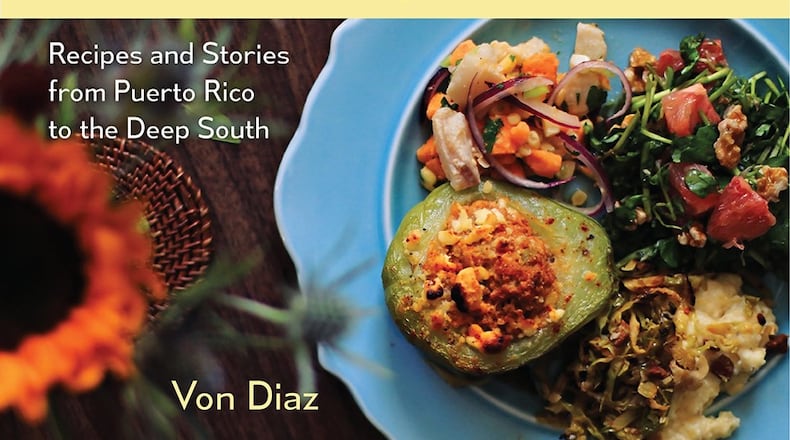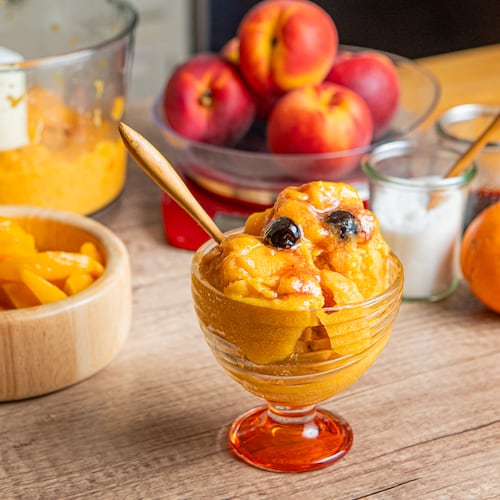Read this cookbook: “Coconuts & Collards: Recipes and Stories from Puerto Rico to the Deep South” by Von Diaz (University of Florida Press, $28)
By Wendell Brock
Von Diaz moved to Atlanta from her native Puerto Rico when she was just 5. Later, after her parents split up, she tells us in her new book: “We lived in a rundown apartment complex in Morrow, Georgia, with rows and rows of identical ugly brick townhouses.”
Her mother worked two jobs to make ends meet, leaving the teenage Diaz to devise family meals from “powdered mac and cheese, chicken nuggets, spaghetti with jarred sauce, off-brand Beefaroni, off-brand American cheese singles, off-brand cereal in plastic bags, hot dogs, canned and frozen vegetables, and boxed mashed potatoes.”
It was a world away from the enchanted island where her grandmother, Tata, kept a lush patio garden of spider plants, ferns and bromeliads, and made her granddaughter grilled-cheese sandwiches stuffed with picadillo -- two at a time, even if the little girl wasn’t hungry.
Today, Diaz lives in Brooklyn, where she works as a writer and radio producer. The food she makes, and describes in her haunting memoir, “Coconuts & Collards,” is a mash-up of classics she learned from her grandmother’s 1962 copy of “Cocina Criolla” (which many consider to be the Puerto Rican “Joy of Cooking”); influences from her second home in the American South (collards, grits, barbecue); and modern twists that prove her homeland’s traditionally pork- and starch-heavy cuisine can be “nourishing, healthy, and light.”
Recipes from each of these genres appear in this collection, which is also steeped with the memories and observations the author acquired from straddling two cultures.
Coconut-Braised Collards. Catfish, Corn, and White Bean Chowder. Pork Ribs with Guava BBQ Sauce: These are some of the Southern-stoked recipes from the chapter called “Mofongo Blues.”
More recently, as she’s ruminated on love, loss and heartbreak, and grown mindful of a pattern of food medicating, she’s tweaked her repertoire to include more sensible creations like Plantain-Crusted Shrimp (broiled, not fried); Watercress Salad with Orange and Avocado; and Mashed Root Vegetables.
From Fried Corn Cigars to Pigeon Peas with Plantain Dumplings to her grandma’s Lemon Meringue Pie and a mojito made with culantro, pineapple and a drop or two of vanilla extract, it all sounds delicious.
But what elevates this book for me is its truth and honesty.
Diaz doesn’t candy-coat the rougher contours of her dichotomous experience, the bumps and bruises, the sorrow and pain, the yearning. “Coconuts & Collards” is a clear-eyed, achingly tender confession of how food can hurt, and how it can heal. What we swallow doesn’t just fuel the body: It nourishes the soul and awakens the heart.
Just as Diaz was putting her book to bed, Hurricane Maria devastated her island home. Now she is haunted by the ruin, what she might encounter the day she returns.
In a way, though, the tragedy makes this book all the more urgent, as a tribute to a way of life, and a cuisine, that may be slowly washing away.
In essence, “Coconuts & Collards” is every bit as poignant as it is appetizing: a testament to how change and upheaval can force us to grow even deeper roots.
Wendell Brock is an Atlanta-based food and culture writer, frequent AJC contributor and winner of a 2016 James Beard Foundation Award for journalism. Follow him on Twitter (@MrBrock) and Instagram (@WendellDavidBrock) .
About the Author
The Latest
Featured


